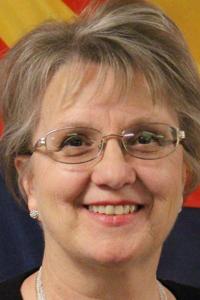PHOENIX — The state Board of Education on Monday rebuffed a bid by schools chief Diane Douglas to adopt standards for public schools crafted by a Christian college for Arizona.
But whether schools may be allowed to use the standards from Hillsdale College remains an open question. Several board members said it might be appropriate to have that as an option for schools that choose not to follow the standards for history, social studies and science that the board did adopt, by a 6-4 vote.
What is clear is that the new standards incorporate some last-minute changes proposed by the Arizona Science Teachers Association. The most notable change includes a clear statement that “the unity and diversity of organisms, living and extinct, is the result of evolution.”
These standards will “protect teachers of science from being put in a position of teaching non-scientific ideas,” said Sara Torres, executive director of the Arizona Science Teachers Association.
Douglas, a member of the Board of Education, lost her bid for re-election as state superintendent of public instruction in the Republican primary and will leave office at the end of the year.
Douglas has said she personally believes in the idea of “intelligent design. Her proposed changes to the education standards did not mention that concept, but she said it is wrong to teach evolution as fact.
The process of revising the standards started two years ago. What Douglas and her aides prepared to present to the board last month proved unacceptable to science teachers.
The teachers sought — and got — restoration of language that says students should be asked to analyze geoscience data and the results from global climate models “to make evidence-based predictions of the current rate and scale of global or regional climate change.” Students will also be able to construction an evidence-based explanation for how the availability of natural resources and changes in climate have influenced human activity.
And the teachers specifically convinced the board to adopt the language about evolution.
The Hillsdale proposal came under scrutiny at least in part amid concerns that it wasn’t so much standards as actual curriculum of what is to be taught. Also controversial was its emphasis on Judeo-Christian teachings, far more than in current state standards in teaching comparative religions.
For example, under the concept of lasting ideas from ancient civilizations, the Hillsdale proposal mentions a “covenant” between God and man and “important stories” like creation and the calling of Abraham. Hillsdale also covers New Testament teachings on the baptism of Jesus, walking on water and the resurrection.
A lack of community input bothered board member Patricia Welborn, who was one of the four votes against the new standards.
Jared Taylor, another dissenter, is the chief executive of Heritage Academy, a charter school. He had specific objections to making the new standards mandatory. One, he said, was the failure to provide “age-appropriate” content to students in kindergarten through third grade.
“You ask them to do a lot of conceptual work,” he said. “And their brains aren’t ready for it.”
Taylor said schools should be free to adopt either the standards approved by the board on Monday or the Hillsdale standards, which were developed for charter schools.




